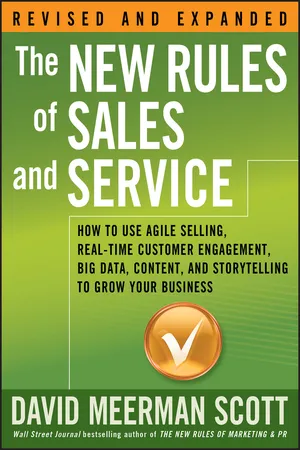
The New Rules of Sales and Service
How to Use Agile Selling, Real-Time Customer Engagement, Big Data, Content, and Storytelling to Grow Your Business
- English
- ePUB (mobile friendly)
- Available on iOS & Android
The New Rules of Sales and Service
How to Use Agile Selling, Real-Time Customer Engagement, Big Data, Content, and Storytelling to Grow Your Business
About this book
The essential roadmap for the new realities of selling when buyers are in charge
Sales and service are being radically redefined by the biggest communications revolution in human history. Today buyers are in charge! There is no more 'selling'—there is only buying. When potential customers have near perfect information on the web, it means salespeople must transform from authority to consultant, product narratives must tell a story, and businesses must be agile enough to respond before opportunity is lost.
The New Rules of Sales and Service demystifies the new digital commercial landscape and shows you how to stay ahead of the pack. Companies large and small are revolutionizing the way business gets done, and this book takes you inside the new methods and strategies that are critical to success in the modern market. Real-world examples illustrate the new marketplace in action, and demonstrate the brilliant utility of taking a new look at your customer and your business. This new edition has been updated to reflect the current reality of this rapidly-evolving sphere, with fresh strategies, new tools, and new stories. Whether you're an independent contractor, a multi-national corporation, a start-up, or a nonprofit, this book is your essential guide to navigating the new digital marketplace.
David Meerman Scott provides up-to-the-minute analysis of the current state of the digital commercial landscape, plus expert guidance toward the concepts, strategies, and tools that every business needs now.
Among the topics covered in detail:
- Why the old rules of sales and service no longer work in an always-on world
- The new sales cycle and how informative Web content drives the buying process
- Providing agile, real-time sales and service 24/7 without letting it rule your life
- The importance of defining and understanding the buyer personas
- How agile customer service retains existing clients and expands new business
- Why content-rich websites motivate interest, establish authority, and drive sales
- How social media is transforming the role of salesperson into valued consultant
Because buyers are better informed, and come armed with more choices and opportunities than ever before, everything about sales has changed. Salespeople must adapt because the digital economy has turned the old model on its head, and those who don't keep up will be left behind. The New Rules of Sales and Service is required reading for anyone wanting to stay ahead of the game and grow business now.
Frequently asked questions
- Essential is ideal for learners and professionals who enjoy exploring a wide range of subjects. Access the Essential Library with 800,000+ trusted titles and best-sellers across business, personal growth, and the humanities. Includes unlimited reading time and Standard Read Aloud voice.
- Complete: Perfect for advanced learners and researchers needing full, unrestricted access. Unlock 1.4M+ books across hundreds of subjects, including academic and specialized titles. The Complete Plan also includes advanced features like Premium Read Aloud and Research Assistant.
Please note we cannot support devices running on iOS 13 and Android 7 or earlier. Learn more about using the app.
Information
1
The Old World of Sales and Service
The Old Sales Model: “Dialing for Dollars”
The Voice of Authority: When the Salesperson Was the Expert
The Salesperson Expert versus the Web-Educated Buyer
Table of contents
- Cover
- Also by David Meerman Scott
- Title Page
- Copyright
- Dedication
- Introduction
- Chapter 1: The Old World of Sales and Service
- Chapter 2: The New Rules of Sales and Service
- Chapter 3: Your Story
- Chapter 4: Integrating Marketing and Sales with Buyer Personas
- Chapter 5: The Sales Cycle Is Now the Buying Cycle
- Chapter 6: Agile, Real-Time Social Sales
- Chapter 7: The New Service Imperative
- Chapter 8: Agile, Real-Time Social Service
- Chapter 9: The Social You
- Chapter 10: Your Social Company
- Acknowledgments
- About the Author
- Index
- Master Newsjacking: The Online Course
- Have David Meerman Scott Speak at Your Next Event!
- End User License Agreement